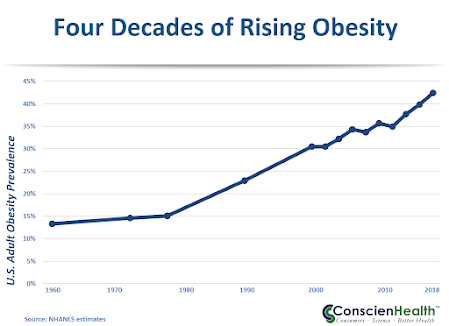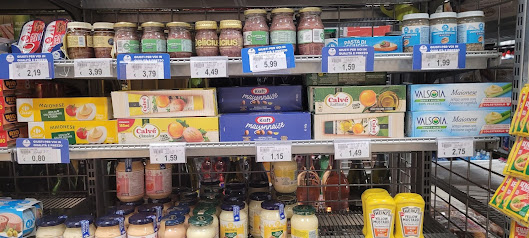The obesity epidemic keeps expanding. The above are, I believe, the most recent data available for the US. The COVID-19 lockdowns and isolation measures are reported having made things even worse. This trend is simply horrendous: what the heck is happening to humankind? (Disclaimer: I am not a nutritionist, I am just someone who is fascinated by data and trends. And, of course, we are all interested in our health! Here, I report some data I found, hoping you may find them useful. Don't take them as the last word on the subject. As always, before acting on things that affect your health, do your own search and use your judgement about what works for you.)
The obesity epidemics had a considerable boost by the lockdowns during the Covid-19 pandemic. Coupled with the opposite effect, that obesity is a risk factor for people who contract Covid, you have a remarkable disaster in the making. With several Western countries having percentages of obese people close to or higher than 50%, one wonders what's going to happen in the future. Why are the human holobionts in such a poor shape?
First, the work by Raubenheimer and Simpson on the food preference of various animals, summarized in a recent book titled, "Eat like the Animals." (Mariner Books, 2021). Their discovery is easy to summarize: it seems that most living beings have a specific set point in their needs for the main nutrients. They seek for a specific balance among proteins, fats, and carbohydrates. In particular, they aim at a minimum intake of protein. If animals are fed an unbalanced diet, for instance, poor in protein, they will tend to eat more food until they reach the right level. Raubenheimer and Simpson call this the "protein leverage hypothesis:"
The story is complicated, and I don't pretend to say anything new. I just want to attract your attention to some recent studies that I think shed some light on the mechanism of human obesity (but even our fellow dog holobionts are suffering from obesity).
"In a protein-poor but energy-rich food environment, humans will overeat carbs and fats to try to reach their protein target. However, when the only available diet is rich in protein, human will underconsume carbs and fats"
Since excess carbohydrates are stored in the body as fat, we can say that one of the causes of the obesity pandemic is that the human diet in Western countries is overstocked in carbohydrates.
Here comes Robert Lustig and his book "Metabolical" (Yellow Kite 2021) where he minces no words on how this is not only true but also a profitable strategy for the food industry. They discovered long ago that if they put more and more carbohydrates (sugars) in the food they sell, then people will get fat, they will eat more, and that will increase their profits. Just like sick people are a boon for medical doctors, obese people are a boon for food producers.
You don't believe that? Let me show you a picture I took a few days ago in an Italian supermarket:
There are four kinds of regular mayonnaise on sale, plus a fancy one with no eggs. Can you guess which is the only one that does not contain added carbohydrates? Let me tell you, it is the most expensive one among the regular ones. All the others contain sugar. Maybe it is not the same for all mayonnaise brands on the market, but I think it is significant. Food companies do add sugar everywhere, even when it is not called for by the traditional recipes. They deny that, but it is written on the list of the ingredients (I have pictures, if you don't believe me!)
Now, it may well be that there is much more to obesity than just carbohydrates, but I think that these results point at an important cause of the problem. There are data showing that what we are seeing may be a delayed effect of "peak sugar" that occurred around the year 2000. From then on, the amount of sugar consumed in the U.S. has been going slightly down. But it remains high.
The beauty of this is that, if it is true, with obesity we don't have such a wicked problem as others, say, global warming. We know that to avoid global warming, we should stop burning hydrocarbons, but it is also true that we can't just stop: billions of people would die. But we could stop, or at least strongly reduce, the extra carbohydrates added to processed food, and we could do it today. Nobody would die, but the problem would be eased and many people would be healthier! But this is the way things are in the world: no problem can ever be solved when there is somebody making money if it remains unsolved.
To make you happier, let me show you some data that tell us that a little excess weight (a little!) is not necessarily bad for your organism. Here are some data from Malcolm Kendrick's wonderful book "The Clot Thickens" (Columbus 2021).
BMI stands for "Body Mass Index" and the overall lowest risk of death is for a BMI of 25-30 that's normally classified as "overweight" (if you want to know, I am at BMI=27). Being underweight is a larger risk than being obese! But obesity has many other problems, not least in terms of self-esteem.
In the end, remember that you are a holobiont and that for hundreds of millions of years your holobiont ancestors never ate anything that was processed in an industrial plant. You are a fine-tuned machine that includes trillions of friendly viruses and bacteria living in your guts. They want a balanced diet of fats, protein, fiber, and not too much in terms of carbohydrates (but you need them, too!). Try to make them happy, and you'll be happier, too!





